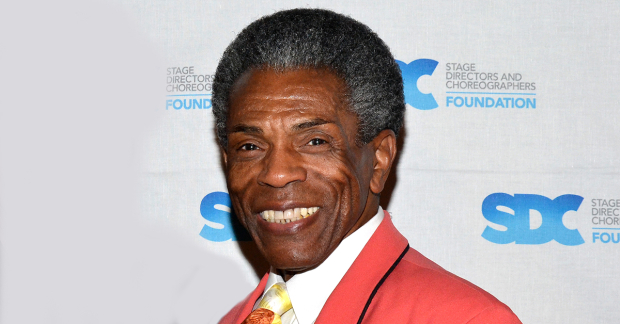Interview: André De Shields Returns to the Stage With His Solo Show About Frederick Douglass
The Tony winner will present his piece live from Flushing Town Hall for a free virtual audience.
Tony winner André De Shields will bring his solo show Frederick Douglass: Mine Eyes Have Seen the Glory to Flushing Town Hall's virtual platform on February 26 at 7pm. Here, De Shields discusses the creation of the piece, and what audiences can expect from the free online performance.

(© David Gordon)
What is Frederick Douglass: Mine Eyes Have Seen the Glory?
Frederick Douglass: Mine Eyes Have Seen the Glory is a conversation that Douglass has with his audience, at the core of which is the ever-evolving response to Europe's othering of all cultures in the African Diaspora.
You started putting this show together more than a decade ago. What was the impetus for creating the piece to begin with? When did you think to yourself, "This would make a good solo piece?"
The impetus for the creation of this piece as a solo performance was the unprecedented election of the first individual of African descent to the highest political office in the United States of America. That was Barack Obama, inaugurated as president on Tuesday, January 20, 2009. The exceptionalism of that occasion was enhanced by the national holiday, celebrating Dr. Martin Luther King Jr., which fell on Monday, January 19, the eve of the inauguration. Moreover, the following month, February, marked Black History Month.
The inspiration came in a flash. Combine the trinity of incidents as a clarion example of the indelible contribution made to world culture by descendants of the African Diaspora. But who was qualified to speak to the extraordinary resonance of this event that had no antecedent? But of course, Frederick Douglass. Whose dream of political equity had been inherited by King; whose biracial heritage had predisposed him to advocating for multiculturalism, just as a similar mixed racial heritage did for Obama, and for whom historian Carter G. Woodson laid the foundation for Black History Month by christening February 7, 1926, Negro History Week.
How has it evolved through the years into the product we'll see on February 26 at Flushing Town Hall?
The evolution of the production is consistently catalyzed by current events. The initial performance was held in the Martin Luther King Jr. Labor Center, when it was housed at Local 1199 Service Employees International Union, 310 West 43rd Street. The following year, the show was produced as a work-in progress by Working Theater at the Abingdon Theatre Company on West 36th Street, and benefitted from a cameo appearance by the spectre of James Baldwin. Since then, ''Frederick Douglass: Mine Eyes Have Seen the Glory' has enjoyed engagements at the Nantucket Athenaeum, where Douglass spoke throughout his life, the Yard on Martha's Vineyard, and Buffalo State College, among other venues. At Flushing Town Hall, the performance will wear a halo of Black Lives Matter.
What can we expect from the show on February 26? Is it an archival recording? Is it a newly created Zoom reading? Where was it performed when it was recorded?
On February 26, the show will be performed live, onstage at Flushing Town Hall for a virtual audience. Research reveals that Frederick Augustus Washington Bailey was born in February 1818, and is believed to have died in February 1895. This morsel of information alone was sufficient reason for Carter G. Woodson — who in 1916, as editor, introduced The Journal of Negro History — to create Negro History week in 1926, honoring both Frederick Douglass, the Great Abolitionist, and Abraham Lincoln, the Great Emancipator, who shared February as a birth month.
Moreover, Douglass, born into slavery, lived through the tapestry of tectonic changes that make the nineteenth century prophetic of 2021: human bondage, the industrial revolution, the emerging of the capitalist economy, the Civil War and the resulting series of Reconstructions, not to mention the epidemic of tuberculosis. My performance as Douglass greatly relies on the tool of anachronism, and I mean that in its ancient Greek sense, "against time." I will appear as Douglass' doppelgänger and speak of events that defined his life and others he could not have experienced; all for the purpose of illustrating how the ship of history lists toward progress. I would like for the viewers to become imbued with nostalgia for the future.
Is it difficult to perform in the solo show format? How do you feel about being alone onstage like that?
The genre of solo performance is an exacting conceit, much like a single parent rearing a precocious child. Notwithstanding the preternatural insights of the child, the parent, in anticipation of unforeseen consequences, must continue to collaborate in the choices and decisions made by the child. Likewise the solo performer must meticulously create the character from its inception, through its development, to its ultimate execution. An unbridled character may entertain risks for which the actor may be unable to vouchsafe. Even a solo performer is never alone onstage; the actor is forever in the company of the character he conceives.
How does the story of Frederick Douglass apply to the world today?
Today's world is, in essence, the result of American Manifest Destiny, which, in spite of its claims of popular sovereignty, more greatly resembles European Imperialism. Frederick Douglass became one of the most influential men of his time by boldly and unapologetically speaking out against the horrors of American oligarchy. There is a direct connection between Douglass' nineteenth century spoken protest and the active protest of today's Black Lives Matter initiative.
What resonances are you hoping viewers on February 26 will take from seeing the show?
My ardent desire for the February 26 audience, and myself, is that together we comprehend the tectonic changes our cultural paradigm is undergoing, that better we loose ourselves from the addiction to a decaying status quo, and dedicate our spiritual energies to transforming our insanity to sanity.










